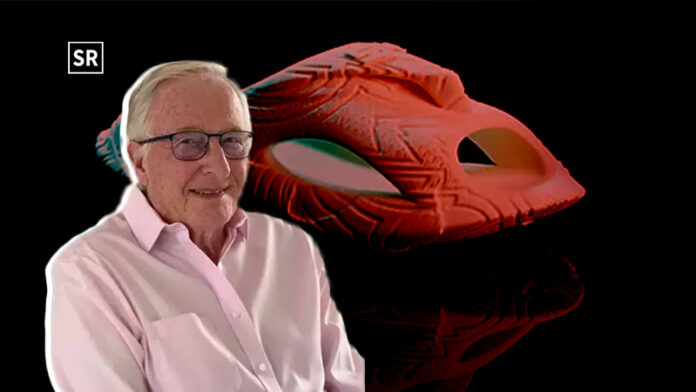
Left to right: Ben Weiss (Syntilay), Joe Foster (Reebok | JW Foster Heritage Ltd), and moderator Scarlett Sieber (Money20/20) during a panel discussion.
A new footwear disruptor is making headlines at the intersection of AI and fashion. Syntilay, founded by entrepreneur Ben Weiss, has unveiled what is believed to be the first commercially available AI-designed shoe—a pair of fully 3D-printed slides that break away from traditional manufacturing.
Speaking to e27 at Money20/20 Asia in Bangkok, Weiss shared insights on the startup’s long journey:
“We recently launched the first AI-made, commercially available slide. It’s been years in the making—building the team, securing the supply chain, and exploring retail partnerships.”
What sets Syntilay apart, according to founder Ben Weiss, is its mission to turn cutting-edge technology into real, consumer-ready products.
“There’s a huge appetite for innovation that reaches people,” he said. “Too many great ideas get stuck in the concept phase—like those futuristic cars that never hit the road. Consumers are tired of that. They want something tangible and new.”
For Weiss, using AI in design isn’t just a gimmick—it’s a powerful tool for efficiency and speed.
“AI allows us to create practical products faster and cheaper. It’s genuinely more efficient,” he noted.
But Syntilay’s vision goes beyond product design. The brand is also building a personalized, accessible customer experience. A soon-to-launch initiative in New York City will let customers order custom-fit shoes using a smartphone.
“We scan your feet using your phone’s camera, with a standard A4 paper for scale. And we’re refining the process for even greater accuracy,” said Weiss.
Syntilay’s go-to-market strategy mirrors its tech-first DNA. Founder Ben Weiss positions the startup as a “social-first brand,” tapping into the power of content creators and online communities for product development and outreach.
“Our brand is built around content creation,” Weiss explained. “To connect with younger audiences, you must meet them where they already are.”
Looking ahead to 2025, Syntilay plans to debut a new line of designs, including creator-led collaborations where influencers act as creative directors of their custom models.
The brand also actively partners with artists, athletes, and cultural tastemakers.
“With our AI-powered design tools and 3d printing, we’re enabling people, many of whom have never designed footwear before, to bring their shoes to life,” said Weiss.
Read also – Stellantis and Leapmotor Join Forces to Establish EV Assembly Hub in Malaysia
Entering White Spaces
While Ben Weiss brings fresh energy and a tech-forward vision to Syntilay, the brand’s strategic depth is strengthened by Joe Foster, co-founder of Reebok.
Foster, who helped grow Reebok into a US$4 billion global brand before stepping away in 1991, sees echoes of his early journey in what Syntilay is building today.
“You have to enjoy the challenges as much as the wins,” Foster told e27. “When starting a business, you decide: do you want to build something to flip, or do you want to build a brand? The latter takes much longer—but it’s worth it.”
Having founded Reebok in 1958, Foster acknowledges how dramatically the branding landscape has evolved.
“We didn’t have social media, computers, or smartphones. Back then, it was all about trade shows and face-to-face meetings. Now, you can connect with your audience instantly. Everything’s changed.”
Why Partner with Weiss?
For Joe Foster, the answer is simple: potential.
“This guy has energy. You can see it; you can feel it. And you need that,” Foster said, referring to Ben Weiss.
Foster also sees Syntilay capitalising on a shift in consumer preferences.
“Sneakers have dominated the streets for years, but now there’s a shift toward simpler footwear, like slides. Ten years ago, people wrote off Crocs. Now, they’re everywhere. So there’s a market for it.”
What excites Foster even more is Syntilay’s use of 3D printing.
“With 3d printing, you can make more with fewer machines. But if you’re aiming for Reebok-level volumes—millions of pairs a month—you’d need to scale with traditional methods,” he noted.
Still, Foster believes Syntilay’s disruptive model has a place in today’s market.
“I like the disruption. I like the change. It’s about finding that unique space—something different—can grow into something huge.”





